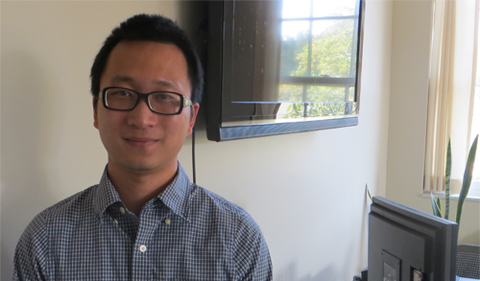
Jiuqing “Joe” Cheng
Ohio University alum Jiuqing Cheng ’16Ph.D. has accepted a position as a Visiting Assistant Professor in the Department of Psychology at the College of William and Mary in Virginia.
Cheng earned his Ph.D. in Psychology in May. He previously earned an M.S. from the Institute of Psychology at the Chinese Academy of Sciences and a B.S. from Shanghai Normal University.
His research interests focus on judgment and decision making, behavioral economics, numeracy, mathematical modeling, and attitude formation bias, trait and cognition. His adviser was Dr. Claudia González-Vallejo, Associate Professor of Psychology at Ohio University.
“I have been at OHIO for seven years, and I really enjoyed the research and teaching experience. My advisor Claudia has always been very supportive, and I published six papers with her,” Cheng says. “Our work taps into different aspects of decision making and aims to describe how people make trade-offs in a variety of situations. More broadly speaking, we are interested in testing how rationality (or irrationality) interacts with environment (particularly with limited resources) to generate decisions.
“Additionally, the Department of Psychology offered great opportunities for graduate students to teach courses independently. I have taught stats, research methods and cognitive psychology over the past years. Teaching not only enhanced my professional skills but also improved communication skills and my English, given I am an international student,” Cheng adds.
“I am personally extremely happy and proud of Jiuqing’s accomplishments,” says González-Vallejo. “He has published work in my lab (the Judgment and Decision Making Laboratory) in top journals, such as Journal and Behavioral Decision Making and PlosOne, to name a couple. He is also an accomplished teacher, and I have no doubts he will shine in his new position at the College of William and Mary.”
Working with Student Senate and Undergraduate Students
Cheng also worked on the Student Senate at OHIO.
“My fellows and I worked on campus issues such as tuition. I made a presentation in the general body meeting about uncertainty and decision making to explain why the guaranteed tuition model had reasonable aspects. One survey that was developed by my colleagues and I was presented at the Board of Trustees meeting,” he says.
“Working on Student Senate taught me how to collaborate with undergraduate students. Indeed, when I had interviews with William & Mary and some other schools, in addition to teaching and research, I was also asked about the experience of working with undergraduate students when I was on student senate,” he notes.
“I don’t think I would have secured the position at William and Mary without the support from my adviser and the valuable experience gained at OHIO,” Cheng says.
Dissertation on Decision Difficulty
“Over the past decades, the research in the area of judgment and decision making mainly focuses on decision preference,” Cheng explains. “Suppose people face two or more options, and the studies test which option people choose. Even though two persons select the same option, their feelings may be very different: one with a lot of hesitation and the other picking the option without any difficulty.
“Thus, my dissertation concentrates on the experience of difficulty when people are making decisions. Beyond traditional self-report measures, I use cursor-trajectory tracking (the rationale is similar to eye-tracking) to depict the difficulty experienced,” he says.
“For example, one can imagine that if a decision is more difficult to make, the decision-maker should spend a longer period, and the trajectory should be more deviant from the most direct choice path. Indeed, in my dissertation, I find that participants displayed more deviant trajectories and longer idle time when making choices that dealt with losses than when making choices that dealt with gains—and more directional flips (left-right movements) when options were similar than when options were less similar. Hence, my dissertation illustrates that the loss context is more difficult than the gain context, and decisions are more difficult when options are similar,” he says.
“Moreover, I also find that decision difficulty is a multi-aspect construct. That is, the measures of idle time and deviation (indicating conflict experience) were most sensitive to the gain-loss manipulation, whereas the measure directional flips (reflecting uncertainty experience) was most sensitive to the similarity between the options. This means that when people are talking decision difficulty, they may actually mean different experiences: conflict vs. uncertainty, and their exact experience is dependent on the decision context, or the reason that causes decision difficulty: loss vs. similarity.”
Cheng’s study is an initial step to uncover decision difficulty with dynamic and online measures. The ultimate goal is to facilitate decision process: the research aims to not only guide people to make wise choices, but also to reduce difficulty when making such choices.
“For example,” he says, “when people do shopping online, they may face a list of similar products in terms of price, quality, rating etc. Since people face greater difficulty when options are similar, additional information should be provided to facilitate decision making. Alternatively, shopping websites should be constructed so that not only similarity but also differences can be easily accessed.”



















Comments